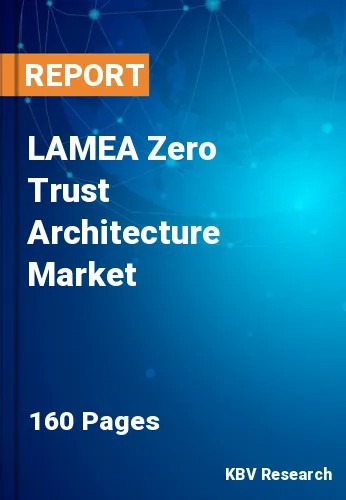The Latin America, Middle East and Africa Zero Trust Architecture Market would witness market growth of 20.5% CAGR during the forecast period (2023-2030).
Zero trust architecture (or ZTA) has emerged as a pivotal paradigm in cybersecurity, reshaping the traditional approach to safeguarding digital assets. According to McKinsey Technology Trends Outlook 2023, as industry-wide expectations for privacy, security, and resilience escalate, trust architectures and digital identity expanded the most among the 14 trends identified in the previous year, growing by nearly 50 percent. Establishing, expanding, and sustaining the confidence of stakeholders regarding the utilization of an organization's data and digitally enabled services and products is made possible by digital-trust technologies.
The fundamental premise of ZTA lies in abandoning the conventional assumption that entities within a network are implicitly trustworthy. Traditionally, organizations operated on the assumption that once a user or device gained access to the corporate network, they could be trusted to a certain extent. However, this trust-centric model has proven vulnerable to various cyber threats, including insider threats, advanced persistent threats (APTs), and phishing attacks.
LAMEA countries are undergoing rapid digital transformation across finance, healthcare, and government services. The system focuses on telemedicine, system certification, cybersecurity, and advanced features, including Artificial Intelligence (AI), analytics, and care model development. The Digital Health Vision is largely supported by digital technology, and by putting this successful plan in place, the Ministry of Health fosters the growth of its digital health ecosystem. Hence, the rising investments in digital health care and healthcare IT are aiding the higher use of cloud services, necessitating the use of security solutions. Therefore, the regional zero trust architecture market will expand in the coming years owing to all these factors.
The Brazil market dominated the LAMEA Zero Trust Architecture Market, By Country in 2022, and would continue to be a dominant market till 2030; thereby, achieving a market value of $1.0 billion by 2030. The Argentina market is showcasing a CAGR of 21.2% during (2023 - 2030). Additionally, The UAE market would register a CAGR of 20.2% during (2023 - 2030).
Based on Component, the market is segmented into Solution, and Services. Based on Organization Size, the market is segmented into Large Enterprises, and Small & Medium Enterprises. Based on Deployment Type, the market is segmented into On-premise, and Cloud. Based on Vertical, the market is segmented into IT & ITeS, Energy & Utilities, Healthcare, Government & Defense, Retail & Ecommerce, BFSI, and Others. Based on countries, the market is segmented into Brazil, Argentina, UAE, Saudi Arabia, South Africa, Nigeria, and Rest of LAMEA.
Free Valuable Insights: The Worldwide Zero Trust Architecture Market is Projected to reach USD 49.6 Billion by 2030, at a CAGR of 15.8%
The market research report covers the analysis of key stake holders of the market. Key companies profiled in the report include Palo Alto Networks, Inc., VMware, Inc., Zscaler, Inc., Akamai Technologies, Inc., Microsoft Corporation, Cisco Systems, Inc., IBM Corporation, Citrix Systems, Inc. (Cloud Software Group, Inc.), Check Point Software Technologies Ltd. and Forcepoint LLC (Francisco Partners).
By Component
By Organization Size
By Deployment Type
By Vertical
By Country
Our team of dedicated experts can provide you with attractive expansion opportunities for your business.

